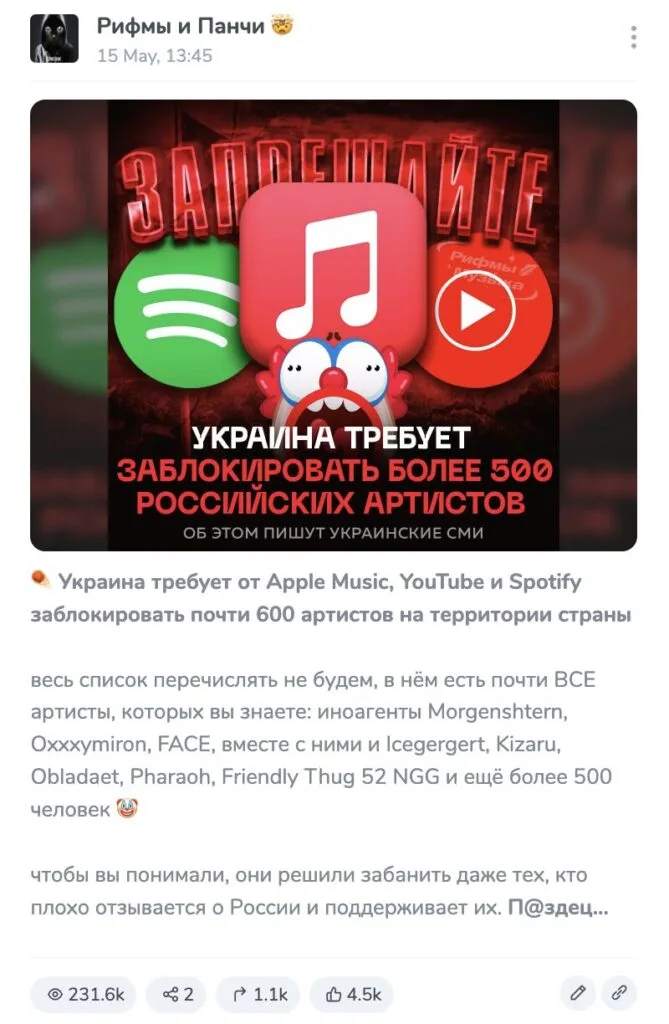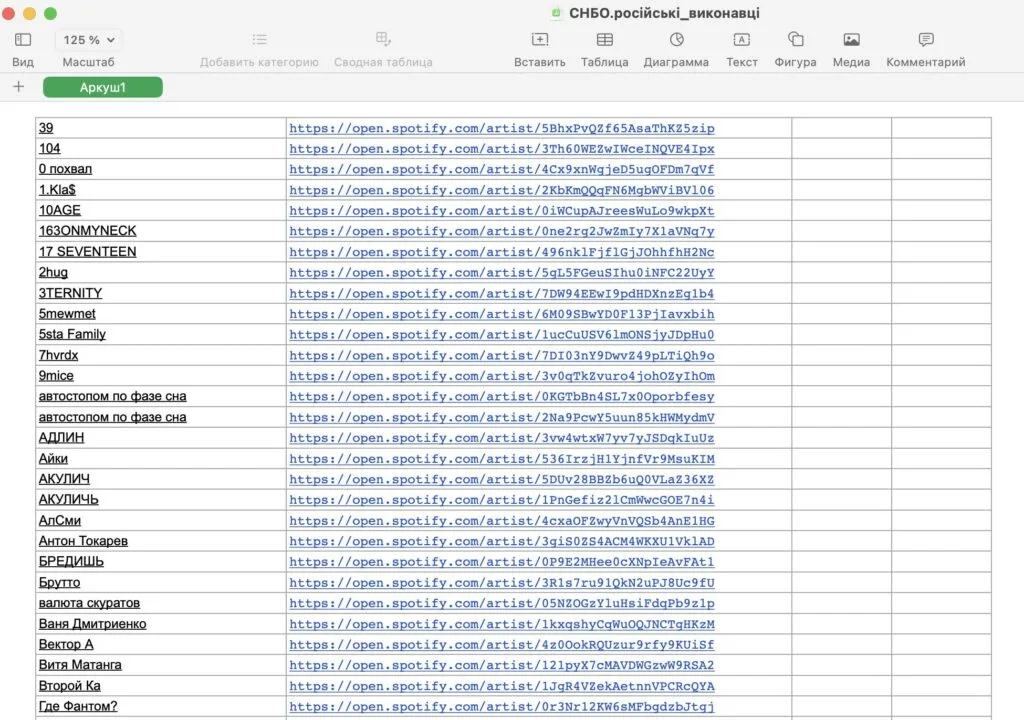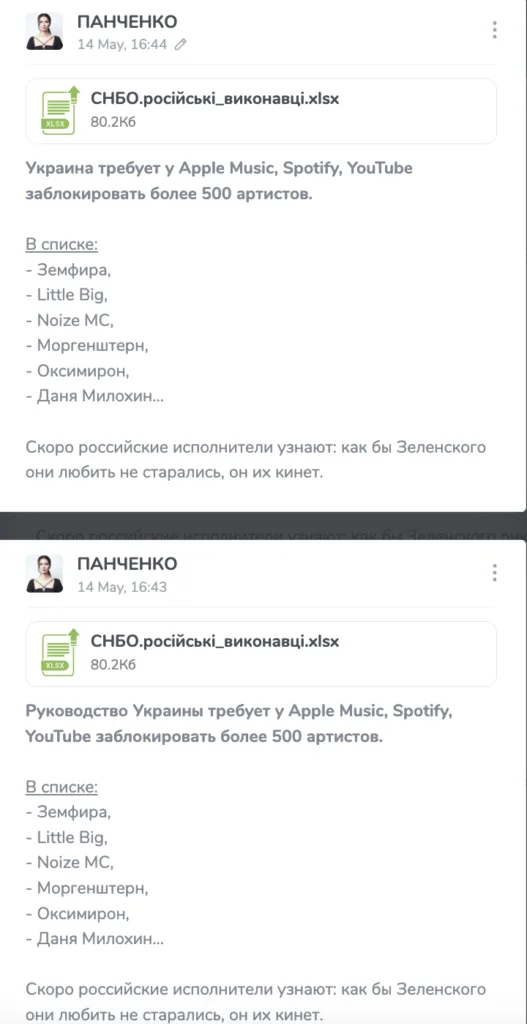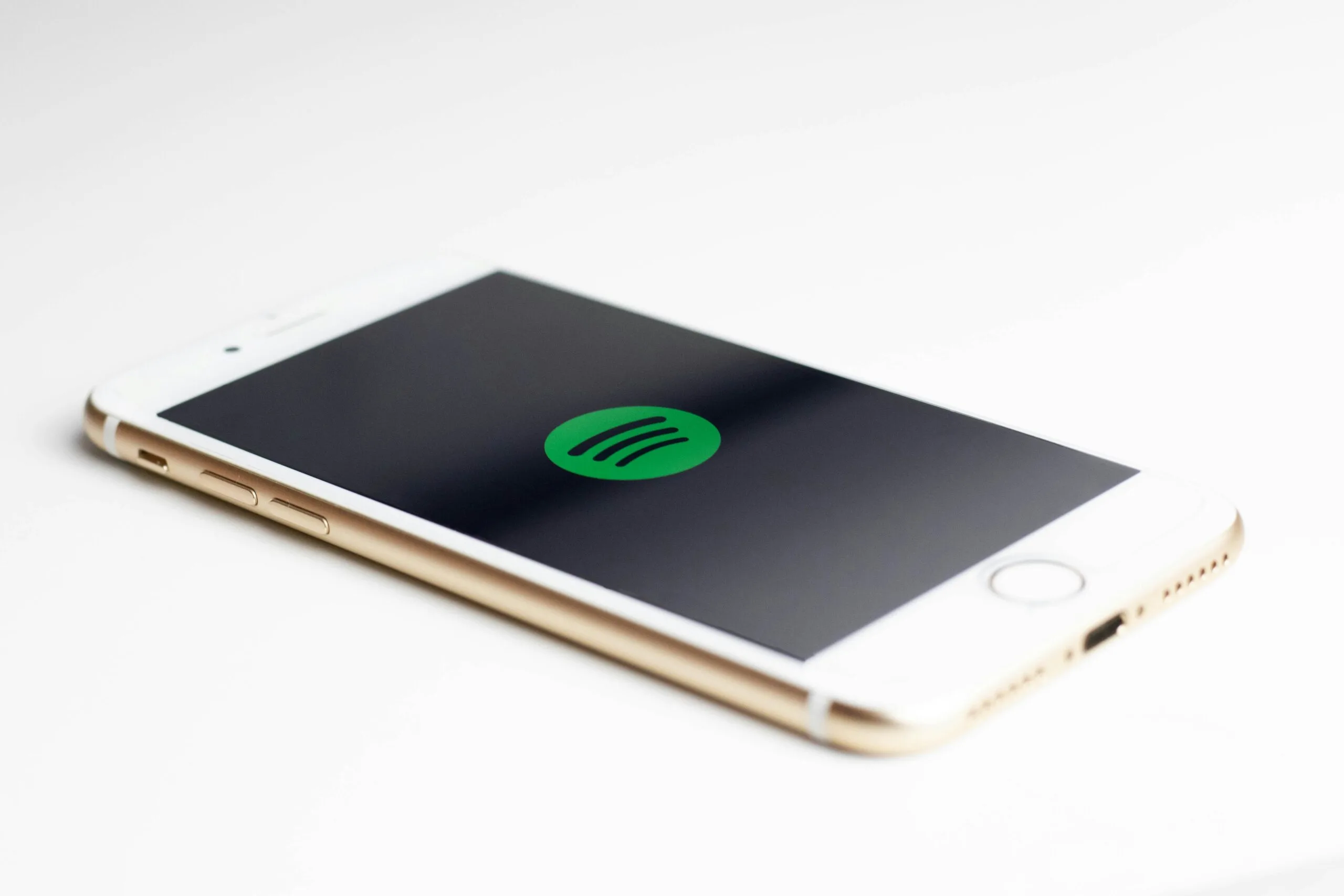In May 2025, a list of Russian performers whose compositions the Ukrainian authorities demanded be removed from YouTube, Spotify and Apple Music was circulated in the media and Telegram channels. We have verified the accuracy of this news.
Reports of Ukraine's demand for the world's largest music services spread on May 14. The publications said that the country's authorities called on Spotify, YouTube and Apple Music to block the accounts of several hundred Russian artists so that they would stop receiving income from monetization. Attached to the posts was a list of 570 musicians, including those who condemned the Russian invasion of Ukraine, for example Zemfira, Monetochka, Noize MC, Face, etc. It was their mention that attracted increased attention from the media and bloggers, who noted that even the political position of the performers did not stop the Ukrainian authorities.
She spoke about this requirement Lenta.ru, as well as Telegram channels "Panchenko"(302,000 views at the time of writing this analysis), "KB"(256,000), "Rhymes and punches"(229,000), "Rhymes and music"(69,000), etc.

In Ukraine, indeed, there are restrictions both against music in Russian and against Russian performers. From summer 2022 in the country valid a law prohibiting the public reproduction of compositions created or performed by artists from the Russian Federation. For residents some cities restrictions even stricter: any public use or listening to Russian-language works is prohibited, regardless of the citizenship of the performer. At the same time, listening to songs in Russian privately is currently not subject to these standards.
However, from time to time there is dissatisfaction among activists that residents of Ukraine can still listen to Russian-language tracks, and some of them are becoming popular, despite the war. In 2023, the Office of the President of Ukraine applied to Spotify asking it to block songs by Russian artists who support the invasion and “Putin’s aggressive policies.” A year later, the streaming service deleted accounts of Shaman, Polina Gagarina, Grigory Leps, Yulia Chicherina, Oleg Gazmanov and the Lyube group; a few days later their channels disappeared on YouTube. However, this decision by both services is not related to the requirement of the Ukrainian authorities, but to announced EU sanctions against these performers. However, Apple Music is still Can unhindered listen any of these artists.
Despite the restrictions, some songs by Russian artists are becoming popular in Ukraine, often sparking new discussions among local activists and the media. At the beginning of April 2025, the song Homay by the Bashkir group Ay Yola gained worldwide fame, topping the Apple Music chart, including in Ukraine. In local media appeared many materials about the dangers of listening to the composition, because, according to the authors of the notes, monetization goes to artists who support the invasion. Activists and journalists made this conclusion in connection with the publication of Ay Yola participant Rinat Ramazanov, who, according to them, spoke on his VKontakte page about seeing off his brother to the war (the profile is now closed, “Verified” was unable to verify this information). However, dissatisfaction caused and the charting of artists who stated their anti-war stance, such as rapper Morgenstern, which is included in list people who pose a threat to national security in the opinion of the Ministry of Culture of Ukraine. The authorities sometimes speak out on similar topics - for example, the song “Sigma Fight”, which was sung by Russian teenage girls Svetlana (Betsy) Chertishcheva and Maria Yankovskaya and which in January came in in the top ten of the world Billboard chart, Ukrainian state Center for Countering Disinformation named part of the information war.
February 17, 2025 local activists launched a petition calling on the authorities to block songs in Russian for streaming users in Ukraine. The authors of the appeal gave several arguments in favor of such a decision: protection of the Ukrainian information space, refusal to finance the aggressor, prohibition of the propaganda of pro-Russian ideas, assistance in the development of Ukrainian music and protection of youth. At the same time, they did not suggest turning to the services themselves to block them, but wanted the Ukrainian authorities to limit access to Russian-language music in the country.
Although the petition quickly received the 25,000 signatures required for consideration, the Cabinet of Ministers of Ukraine refused to satisfy the demands specified in it. The government referred to the fact that there are no legal grounds in Ukrainian and international legislation to restrict access to musical works based on language. At the same time, the authorities’ decision emphasizes that, due to public outcry and in order to ensure the information and national security of Ukraine, the responsible ministries have been instructed to further study this issue.
Publications that Ukraine has demanded that streaming services block more than 500 Russian performers are being distributed along with a list of these musicians. It is designed in the form of an Excel table called “NSBO.rosiyski_vikonavtsi” (“NSDC Russian performers” - Ukrainian). The document consists of pairs of names and links to Spotify accounts without any explanation (and even links to Apple Music profiles and YouTube channels, which are also supposedly proposed to be closed).

The publications do not say where the table was taken from, but the file name indicates the abbreviation of the National Security and Defense Council of Ukraine. He regularly announces sanctions against Russian cultural figures, which come into force after approval by the country's president. The last such decree is Vladimir Zelensky signed April 18. The sanctions include the deprivation of Ukrainian state awards, the blocking of assets and the restriction of trade transactions, but do not prohibit Ukrainians from listening to the songs of such artists in private. On the official website of the department No document from viral publications. Moreover, it is strange that in the file name the abbreviation is indicated in Russian (in Ukrainian it looks like RNBO).
Some posts say that the list was compiled not by the National Security and Defense Council, but by the Ministry of Culture of Ukraine. This department, as mentioned above, publishes a list of persons who, in his assessment, threaten the national security of the country. It includes more than 200 Russian cultural figures. However, the ministry’s website also No no list from social networks, no appeal to music platforms.
In addition, the logic of adding an artist to the register from viral publications is unclear. The table includes performers who condemned the Russian invasion of Ukraine and those who did not speak publicly about the war at all. However, there are not many musicians there who openly supported the aggression and therefore fell under Ukrainian sanctions. So, the document does not indicate entered on the latest sanctions list Garik Sukachev and Alexander Rosenbaum, as well as those who under sanctions for a long time - for example, Stas Piekha or Anita Tsoi. The above-mentioned Shaman, Gagarina, Leps, Chicherina, Gazmanov and “Lyube” are also not there, as well as the outraged activists of Ay Yola and the performers of the song “Sigma Boy”. It is unlikely that the Ukrainian authorities drew up a similar document, but did not include in it those against whom they themselves imposed sanctions, and those who were recently actively discussed by Ukrainian society.
If the criterion for getting on the list is not political support, then it could be the citizenship of the aggressor country (which Russia recognized back in 2015), especially since Ukraine already has something suitable for this legislation, which was mentioned above. But this hypothesis is not confirmed either - in addition to Russian performers, the list includes Belarusian, Kazakh, Armenian and even Ukrainian artists who release songs in Russian. Some of them create compositions in the national languages of their countries, which also raises the question of whether it is necessary to block their entire repertoire or only Russian-language tracks. In addition, an American rapper unexpectedly made it onto the list. NLE Choppa, performing tracks exclusively in English.
Finally, the list and news about the demand to block the artists mentioned in it were not disseminated in the Ukrainian-language media. Given the resonance of this topic, it is unlikely that journalists would have missed such information.
The news spread mainly through Russian-language sources, and for the first time appeared in the Telegram channel of Ukrainian pro-Russian journalist Diana Panchenko on May 14 at 16:43 Moscow time. By data TGStat, she first wrote that the demand came from the leadership of Ukraine, and then changed the wording to even less specific (“Ukraine demands”). She was the first to post a list of artists without indicating its source.

In February 2022, Panchenko sharply condemned full-scale Russian invasion, but in August of the same year she moved to the occupied territories of Ukraine and stated that her previous posts were written under pressure. In 2023, Ukrainian authorities introduced sanctions against her, and then accused in high treason. Now Panchenko is a frequent heroine pro-Kremlin Media.
The topic of bans on listening to Russian-language songs in Ukraine has long attracted the attention of pro-Kremlin media and Telegram channels. Often their publications are based on manipulation or exaggeration - “Verified” sorted it out some are like that messages.
Thus, there is no evidence that the distributed list was prepared by the Ukrainian authorities and sent to streaming services for the subsequent blocking of Russian musicians. Three months ago, the Cabinet of Ministers of Ukraine, responding to a request from activists, indicated: neither Ukrainian nor European legislation allows such blocking. The origin of the list itself remains extremely doubtful.
Cover photo: Unsplash
- Is it true that a cartoon was shown in Ukraine with a call to report to the SBU about relatives listening to music in Russian?
- Is it true that teenagers were detained in Kyiv for listening to Russian music on the street?
- Is it true that Noize MC performed in a T-shirt with the symbols of the Azov Brigade?
- Is it true that the singer Monetochka gave the Russians an ultimatum: “Either me or Putin”?
- Did Oleg Gazmanov write on Twitter that he had to cancel a concert in Kherson due to unsold tickets?
If you find a spelling or grammatical error, please let us know by highlighting the error text and clicking Ctrl+Enter.






